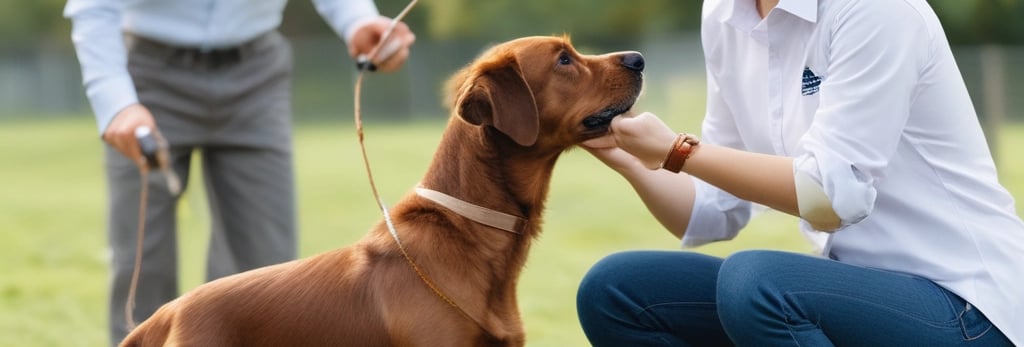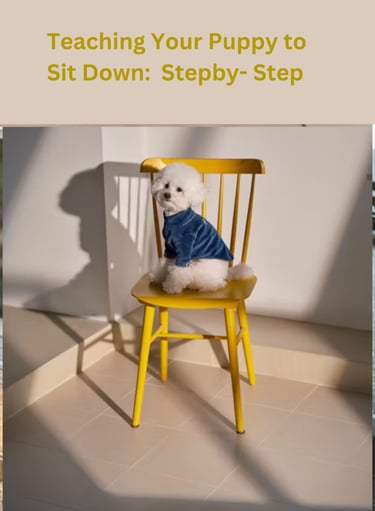Continuous Training: The Importance of Lifelong Learning for Your Growing Puppy
now that your puppy has grown into an adult dog, you might think that training is no longer necessary. However, this couldn't be further from the truth.


The Foundations of Puppy training
The journey of puppy training begins with the understanding of how puppies learn and develop. Early training experiences play a pivotal role in shaping a puppy’s behavior and personality.
Puppies are naturally curious and eager to explore their environment, making this an optimal time to introduce them to various training concepts.
Understanding that puppies learn through positive reinforcement allows trainers to create a conducive learning environment where desired behaviors are encouraged and rewarded.
Socialization is a fundamental aspect of puppy training that cannot be overlooked. It refers to the process of exposing your puppy to a variety of people, animals, environments, and experiences.
This exposure during the critical developmental stages helps puppies build confidence and reduces the likelihood of fear or aggression later in life.
It is essential to introduce them to different sights, sounds, and smells, ensuring that each interaction is positive. Socialization should start as early as eight weeks of age, facilitating a well-adjusted adult dog.
Establishing a behavior foundation is key to successful puppy training. This foundation includes teaching basic commands such as "sit," "stay," and "come." These commands help manage behavior and can be invaluable in ensuring safety and good manners.
Common training methods include clicker training, leash training, and crate training, all of which foster effective communication between the owner and the puppy.
Utilizing consistency and patience in these initial stages ensures that the puppy understands expectations and desired behaviors.
As puppies progress in their training, reinforcing positive behavior while preventing negative actions becomes crucial.
Employing these foundational techniques will not only yield an obedient puppy but will also cultivate a trusting and lifelong bond between the owner and pet.
This solid groundwork is essential for continued training and social experiences throughout the dog’s life.
Understanding the Need for ongoing training
Training should never be viewed as a one-time task for your growing puppy. Just as humans require continuous learning to adapt and thrive, dogs greatly benefit from lifelong training and consistent mental stimulation.
The journey of a puppy’s education does not end with basic commands or socialization; ongoing training is crucial in ensuring behavioral stability and emotional well-being throughout their life.
Without ongoing training, dogs may develop undesirable behaviors. A lack of structure and mental engagement can lead to anxiety, excessive barking, digging, or even aggression.
These behavioral issues stem from boredom and an unmet need for activity and challenge. Regular training sessions can mitigate these problems by providing mental stimulation and reinforcing boundaries.
Moreover, the act of training engages a dog’s natural instincts to learn and explore, contributing to their overall happiness and reducing the likelihood of behavioral problems.
Additionally, ongoing training strengthens the bond between the pet and the owner. Through regular practice, owners are better equipped to understand their dog’s needs and responses.
This mutual understanding fosters a deeper connection, allowing for improved communication and trust.
When owners invest time in structured training, they not only enhance their dog's skills but also create a supportive environment conducive to a well-adjusted and contented pet.
Furthermore, the learning process allows dogs to adapt to new situations, experiences, and environments, which is essential as they grow older.
Age-related changes may present new challenges that necessitate a refresh of skills learned earlier in life. Ongoing training can help dogs navigate these transitions smoothly, making both the dog and owner more resilient in the face of life's uncertainties.
Techniques for Continuous learning
As your puppy matures, implementing effective training techniques becomes crucial for their development and behavioral well-being. One of the primary methods is advanced obedience training, which goes beyond basic commands.
This aspect focuses on reinforcing essential skills such as sit, stay, and heel while introducing more complex tasks.
This not only enhances discipline but also fosters a deeper bond between the dog and owner.
Advanced obedience training can include commands like “leave it” or “come from a distance,” which are vital for safety and control in various environments.
Trick training is another engaging technique that allows for continuous learning. Teaching your puppy fun tricks, such as rolling over, playing dead, or even dancing, can significantly enhance their cognitive abilities and dexterity.
This type of training emphasizes positive reinforcement and encourages the puppy to explore their limits.
Not only does this create an enjoyable learning experience, but it also boosts the dog’s confidence, making them more eager to learn new things.
It is essential to remember that a joyous atmosphere during training helps in retaining the puppy's interest and motivation.
Agility courses present an additional and dynamic way to supplement training. These courses can include obstacles like tunnels, jumps, and weave poles, encouraging physical and mental stimulation.
Engaging in agility training not only enhances physical fitness but also develops problem-solving skills, ensuring the dog remains active and enthusiastic about learning.
Moreover, agility courses provide an excellent opportunity for socialization with both humans and other dogs, fostering important behavioral skills.
Incorporating fun and variety keeps training sessions exciting and fresh. This could mean using different locations, changing the types of rewards, or introducing new activities.
A diverse approach to training ultimately sustains the puppy's engagement while promoting continuous learning throughout their life.
The Long-Term : Benefits of Lifelong Training
Lifelong training plays a pivotal role in cultivating a well-behaved and socially adept dog. One of the most significant long-term benefits of continuous training is the improvement in a puppy’s behavior.
A well-trained dog tends to exhibit fewer behavioral issues such as excessive barking, anxiety, and aggression.
By consistently engaging in training exercises, owners can reinforce positive behaviors, making the dog more responsive to commands and easier to manage in various situations.
Furthermore, training fosters better social skills. As puppies are exposed to different environments, people, and other animals through ongoing training, they learn how to interact appropriately.
This exposure helps to reduce fear or anxiety in unfamiliar situations, making the dog more comfortable and confident as it grows.
Socialization sessions and training classes provide excellent opportunities for puppies to engage with other dogs and people, facilitating positive interactions that contribute to their social development.
Another important benefit of lifelong training is enhanced adaptability. Dogs that undergo continuous training are often more agile in adjusting to new environments or changes in their routines.
Whether moving to a new home, welcoming a new family member, or adapting to traveling, a well-trained dog is typically more resilient.
Their familiarity with commands and situational cues allows them to navigate transitions with ease.
Beyond the dog’s well-being, a commitment to ongoing training significantly enriches the owner's experience as well.
Having a well-adjusted and well-trained puppy reduces stress and enhances the bond between pet and owner.
Engaging in training together also promotes teamwork and communication, resulting in a fulfilling companionship.
Thus, both the dog and the owner benefit from the long-term advantages of continuous training, leading to a happy and harmonious household.











